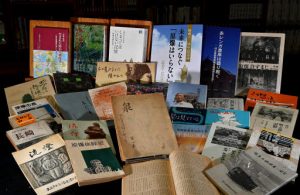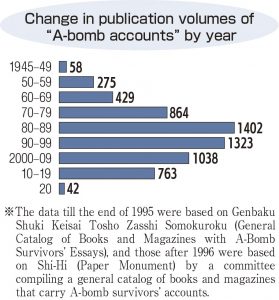Over 75 years, 6,194 A-bomb accounts have been published by citizens and family members transcribing A-bomb survivors’ experiences
Jan. 6, 2021
by Masami Nishimoto, Senior Staff Writer
During the 75 years since the atomic bombings in 1945, the number of published A-bomb accounts describing A-bomb survivors’ experiences of the bombings of Hiroshima and Nagasaki was recently found to have reached 6,194 by the end of 2020. Considering the publications by decade, in the 1980s when there were approximately 350,000–370,000 A-bomb survivors still alive, a record number of 1,402 volumes were published. That number, however, dropped to 763 in the 2010s, and in 2020, when the average age of the A-bomb survivors had reached 83.31 years, only 42 volumes were published. In recent years, the children and grandchildren of those who experienced the atomic bombings, as well as members of the public, have been working to compile and publish such accounts. The work of listening to and transcribing into printed form the testimonies of survivors promotes the continuation of such A-bomb accounts, which serve to convey the inhumane nature of nuclear weapons.
An A-bomb account research group, represented by Satoru Ubuki, 74, a resident of Kure City and author of Genbaku Shuki Keisai Tosho Zasshi Somokuroku (General Catalog of Books and Magazines Carrying A-Bomb Survivors’ Essays), which contains information about 3,677 books and magazines during a 50-year period after the atomic bombings, explored a variety of publications, including privately-held books and organizational bulletins. The group has searched and confirmed documents going back to the past by reviewing books and magazines obtained by or donated to the Hiroshima Peace Memorial Museum and the Hiroshima National Peace Memorial Hall for the Atomic Bomb Victims.
In Aomori Prefecture, there are 42 A-bomb survivors in possession of Atomic Bomb Survivor’s Certificates. In October last year, the Aomori Prefectural A-bomb Sufferers’ Association published 400 copies of a book titled Mirai ni Tsunagu—“Genbaku wa Iranai” (Linking to the Future—“We Do Not Need A-bombs”), in commemoration of the 60th anniversary of its establishment, and donated the publications to libraries and other organizations in the prefecture.
The published book contains new memoirs and testimonies of 18 A-bomb survivors, including Kinuyo Fukui, 90, who experienced the atomic bombings both in Senda-machi, located in Hiroshima’s Naka Ward, and in her hometown of Nagasaki, to which she had evacuated after the Hiroshima bombing, and an in-utero exposed male survivor. Although she has no family who experienced the atomic bombing, Yasuko Tsujimura, 62, one of the office staff of the sufferers’ association and a caregiver, compiled the book. She hopes the publication will help people understand that calls and movements in Aomori Prefecture calling for the abolition of nuclear weapons continue to this day.
An association of second- and third- generation A-bomb survivors living in Kyoto has listened to the A-bomb experiences and thoughts of their parents and the plaintiffs in class-action lawsuits concerning A-bomb disease certification since 2013, the year following establishment of the association, and published a book titled Kataritsugu Hiroshima Nagasaki no Kokoro (Spirits of Hiroshima and Nagasaki to be Handed Down) in July 2020. Of the 50 individuals whose memoirs are included in the book, 11 have apparently already died.
In 2020, the year marking the 75th anniversary of the atomic bombings, the coronavirus pandemic made it difficult for A-bomb survivors to be interviewed. The publication of Vol. 26 of Tsutaete Kudasai Ashitae (Please Convey These Stories to the Next Generations), a collection of memoirs that FCO-OP in the town of Sasaguri-machi, Fukuoka Prefecture has issued since 1994, had to be postponed. Instead, in June, they published a recitation script that had been compiled from previous collections of testimonies.
At the end of the same year, a collection of testimonies of A-bomb survivors living in South Korea titled Wagami ni Kizamareta Hachigatsu (August Inscribed in My Body) was published in Japanese. The publication contains the testimonies of 11 A-bomb survivors from Hiroshima and nine survivors from Nagasaki. The book was originally published in 2008 in Korean based on a survey conducted by the South Korean government, and then translated into Japanese by a government-affiliated support foundation and Japanese and South Korean citizens.
The collection of such A-bomb accounts began in August 1946, when a mimeograph titled Izumi: Mitama no Mae ni Sasaguru (Fountain Offered Before the Spirits), was published by students at Hiroshima First Middle School (now Kokutaiji High School). When Mr. Ubuki, then an assistant professor at Hiroshima University, compiled a collection in 1999, it was found that 120 volumes containing 534 A-bomb accounts had been published by April 1952, the time the U.S. army-led occupation concluded.
On the 20th anniversary of the atomic bombing, schools, businesses, labor unions, and regional A-bomb groups took the initiative in publication, and by 1995, 50 years after the atomic bombing, 300 volumes were published. As of the end of March 2020, the number of A-bomb survivors, including those living overseas, totaled 136,682. The time left for interviewing A-bomb survivors and compiling their experiences in the first person is steadily decreasing.
Clues for understanding human tragedies
Comments by Satoru Ubuki: Written accounts of the atomic bombings are important clues for understanding the human tragedies and for considering how A-bomb experiences have been conveyed and interpreted. Activities involving the listening to and recording in written form of the A-bomb experiences have continued because survivors have been working to leave their stories behind and listeners have been striving to leave the accounts to future generations. Much remains to be done at home, at school, and in the community, and at the same time, fully utilizing the A-bomb accounts is also something that needs to be considered.
(Originally published on January 6, 2021)
During the 75 years since the atomic bombings in 1945, the number of published A-bomb accounts describing A-bomb survivors’ experiences of the bombings of Hiroshima and Nagasaki was recently found to have reached 6,194 by the end of 2020. Considering the publications by decade, in the 1980s when there were approximately 350,000–370,000 A-bomb survivors still alive, a record number of 1,402 volumes were published. That number, however, dropped to 763 in the 2010s, and in 2020, when the average age of the A-bomb survivors had reached 83.31 years, only 42 volumes were published. In recent years, the children and grandchildren of those who experienced the atomic bombings, as well as members of the public, have been working to compile and publish such accounts. The work of listening to and transcribing into printed form the testimonies of survivors promotes the continuation of such A-bomb accounts, which serve to convey the inhumane nature of nuclear weapons.
An A-bomb account research group, represented by Satoru Ubuki, 74, a resident of Kure City and author of Genbaku Shuki Keisai Tosho Zasshi Somokuroku (General Catalog of Books and Magazines Carrying A-Bomb Survivors’ Essays), which contains information about 3,677 books and magazines during a 50-year period after the atomic bombings, explored a variety of publications, including privately-held books and organizational bulletins. The group has searched and confirmed documents going back to the past by reviewing books and magazines obtained by or donated to the Hiroshima Peace Memorial Museum and the Hiroshima National Peace Memorial Hall for the Atomic Bomb Victims.
In Aomori Prefecture, there are 42 A-bomb survivors in possession of Atomic Bomb Survivor’s Certificates. In October last year, the Aomori Prefectural A-bomb Sufferers’ Association published 400 copies of a book titled Mirai ni Tsunagu—“Genbaku wa Iranai” (Linking to the Future—“We Do Not Need A-bombs”), in commemoration of the 60th anniversary of its establishment, and donated the publications to libraries and other organizations in the prefecture.
The published book contains new memoirs and testimonies of 18 A-bomb survivors, including Kinuyo Fukui, 90, who experienced the atomic bombings both in Senda-machi, located in Hiroshima’s Naka Ward, and in her hometown of Nagasaki, to which she had evacuated after the Hiroshima bombing, and an in-utero exposed male survivor. Although she has no family who experienced the atomic bombing, Yasuko Tsujimura, 62, one of the office staff of the sufferers’ association and a caregiver, compiled the book. She hopes the publication will help people understand that calls and movements in Aomori Prefecture calling for the abolition of nuclear weapons continue to this day.
An association of second- and third- generation A-bomb survivors living in Kyoto has listened to the A-bomb experiences and thoughts of their parents and the plaintiffs in class-action lawsuits concerning A-bomb disease certification since 2013, the year following establishment of the association, and published a book titled Kataritsugu Hiroshima Nagasaki no Kokoro (Spirits of Hiroshima and Nagasaki to be Handed Down) in July 2020. Of the 50 individuals whose memoirs are included in the book, 11 have apparently already died.
In 2020, the year marking the 75th anniversary of the atomic bombings, the coronavirus pandemic made it difficult for A-bomb survivors to be interviewed. The publication of Vol. 26 of Tsutaete Kudasai Ashitae (Please Convey These Stories to the Next Generations), a collection of memoirs that FCO-OP in the town of Sasaguri-machi, Fukuoka Prefecture has issued since 1994, had to be postponed. Instead, in June, they published a recitation script that had been compiled from previous collections of testimonies.
At the end of the same year, a collection of testimonies of A-bomb survivors living in South Korea titled Wagami ni Kizamareta Hachigatsu (August Inscribed in My Body) was published in Japanese. The publication contains the testimonies of 11 A-bomb survivors from Hiroshima and nine survivors from Nagasaki. The book was originally published in 2008 in Korean based on a survey conducted by the South Korean government, and then translated into Japanese by a government-affiliated support foundation and Japanese and South Korean citizens.
The collection of such A-bomb accounts began in August 1946, when a mimeograph titled Izumi: Mitama no Mae ni Sasaguru (Fountain Offered Before the Spirits), was published by students at Hiroshima First Middle School (now Kokutaiji High School). When Mr. Ubuki, then an assistant professor at Hiroshima University, compiled a collection in 1999, it was found that 120 volumes containing 534 A-bomb accounts had been published by April 1952, the time the U.S. army-led occupation concluded.
On the 20th anniversary of the atomic bombing, schools, businesses, labor unions, and regional A-bomb groups took the initiative in publication, and by 1995, 50 years after the atomic bombing, 300 volumes were published. As of the end of March 2020, the number of A-bomb survivors, including those living overseas, totaled 136,682. The time left for interviewing A-bomb survivors and compiling their experiences in the first person is steadily decreasing.
Clues for understanding human tragedies
Comments by Satoru Ubuki: Written accounts of the atomic bombings are important clues for understanding the human tragedies and for considering how A-bomb experiences have been conveyed and interpreted. Activities involving the listening to and recording in written form of the A-bomb experiences have continued because survivors have been working to leave their stories behind and listeners have been striving to leave the accounts to future generations. Much remains to be done at home, at school, and in the community, and at the same time, fully utilizing the A-bomb accounts is also something that needs to be considered.
(Originally published on January 6, 2021)









